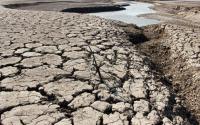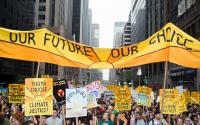| 9 November 2004 Joan Lowy |
WASHINGTON, D.C. -- Despite the release of two major studies that conclude global warming is having a major impact on the United States faster than many scientists had anticipated, President Bush is unlikely to significantly alter his stance on the issue, a White House official said Monday.
Mandatory regulation or caps on greenhouse-gas emissions are unlikely for the foreseeable future, White House science adviser John Marburger said in an interview.
"Not in this administration," he said.
A report by the Pew Center on Global Climate Change found "abundant evidence" that global warming has begun to affect plants and animals in every region of the United States, from the earlier nesting of birds in the desert Southwest to the earlier flowering of trees in forests around the Great Lakes.
Another report, commissioned by the United States and other nations with Arctic territory, found that northern Alaska and the rest of the Arctic are warming rapidly, with the loss of polar ice projected to accelerate global warming and contribute to sea-level rise and flooding.
'Here and now'
Both reports conclude that the warming is caused by the heat-trapping emissions released by human burning of fossil fuels.
"The message is that global warming is here and now," said Hector Galbraith, an ecological research consultant in Newsane, Vt., and coauthor of the Pew report. "It's surprising to me how soon we're seeing these impacts and how ubiquitous they are."
Despite saying the Bush administration would not change its policy on greenhouse-gas emissions, Marburger praised the two new reports.
"I think it's always good to have good scientific information, and these reports appear to be responsible," he said. "The Arctic report points pretty clearly to effects, and we've known about other things that are happening around the world."
Bush kept the United States out of the Kyoto Protocol, the international treaty to curb greenhouse-gas emissions, saying it would be too costly for the United States.
Instead, he has pushed a plan that allows U.S. greenhouse-gas emissions to continue to increase, but at a slightly slower rate of growth as the result of increased efficiency in the use of energy.
The administration has also pumped billions of dollars into research on long-term alternative sources of energy, such as hydrogen fuel cells.
'Flexible enough'
"I think the present policy is flexible enough to accommodate these existing reports and any recent scientific reports that I am aware of," Marburger said. "There is general acceptance of the need to decrease the amount of [carbon dioxide] produced in the process of making energy. Exactly how you go about doing that and how much is necessary is not yet understood."
In response to the new reports, Sens. John McCain, R-Ariz., and Joseph Lieberman, D-Conn., renewed their calls to pass bipartisan legislation capping greenhouse-gas emissions.
"We have a responsibility to those who will inherit the Earth from us to take immediate steps to stop the worst of these impacts," Lieberman said.
The Arctic Climate Impact Assessment, conducted and reviewed by nearly 300 scientists, is the most comprehensive evaluation to date of the impact of climate change.
Its release was initially scheduled to be accompanied by a set of policy recommendations, but the Bush administration pressured other nations not to release those recommendations, Sheila Watt-Cloutier, chairwoman of the Inuit Circumpolar Conference, said in Senate testimony.
The Pew report looked at 40 studies from around the United States on changes in plants and animals as the result of global warming.
"The amazing thing is that we're finding there are responses [in plants and animals] all the way from Florida to Alaska and from the East Coast to the West Coast," said Camille Parmesan, a biologist at the University of Texas at Austin and coauthor of the Pew report.
"People should know climate change is affecting what is happening in their back yard," she said.
http://www.startribune.com/dynamic/story.php?template=print_a&story=5075601






